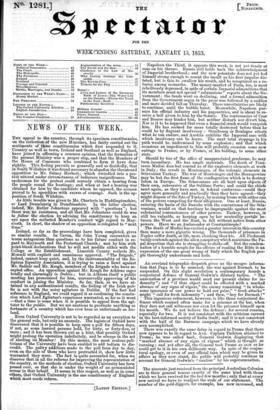Napoleon the Third, it appears this week, is not yet
firmly at ease on his throne. Russia still holds back the acknowledgment
of Imperial brotherhood ; and the new potentate does not yet feel himself strong enough to resent the insult as his first impulse dic- tated, but is fain to swallow his wrath, and be recognized as a ro- turier among monarchs. The money-market of Paris, too, is most rebelliously depressed, in spite of certain Imperial admonitions that its members must not spread "calumnious" reports about the Go- vernment: the funds went on declining, and a formal admonition from the Government organ in the press was followed by a sudden and more decided fall on Thursday. These uncertainties are likely to continue, until the bubble burst. Meanwhile, Napoleon pur- sues his official industry and his pageantries, and is about to re- ceive a ball given to him by the Senate. The contumacies of Czar and Bourse may hinder him, but neither disturb nor divert him.
Nor is it to be supposed that even a financial crash would vanquish him. He has seemed far more totally destroyed before than he could be by flagrant insolvency : Strasbourg or Boulogne attests
what he can endure, and Austria exhibits the Imperial ease with which insolvency can be borne. The next total stoppage in his
path would be undermined by some explosion ; and that which occasions an impediment to him will probably occasion some new outrage to France, or by France, at his bidding, to some other state.
Should he tire of the office of unappreciated gendarme, he may turn incendiary. He has ample materials. The death of Fran- cesco Medial does but remind us of the explosive elements at work in Italy ; the revolt in Montenegro, of the volcanic elements in Sclavonian Turkey. The war of Montenegro and the Herzegowine may be but the first flame of the conflagration which is to destroy Islam in Europe. The Sclavonians are all bent upon objects of their own, subversive of the Sublime Porte ; and could the chiefs meet again, as they have met, in federal conference—could they agree more generally and practically than they have agreed—they might dispose of the fate of Turkey, by making terms with either one of the powers competing for their allegiance. One at least, Russia, entering the basin of the Danube with the concurrence of the Sala- vonians, would on that territory be impregnable against the most substantial remonstrances of other powers. Turkey, however, still too valuable, as keeping open by her neutrality portals be- tween the West and the East, to fall without notice from other powers. Have we an Ambassador at Constantinople? The death of Madiai has excited a greater interest in this country than many a more gigantic wrong. The thousands of prisoners in Naples suffer death, or life, more shocking than his. All Piedmont vainly contends against the alien conspiracy which maintains the Pa- pal despotism that she is struggling to shake off. But the condem- nation of a humble couple for the offenoe of reading the Bible is an expression of the one great wrong of Italy which the English peo- ple thoroughly understands and feels.
























